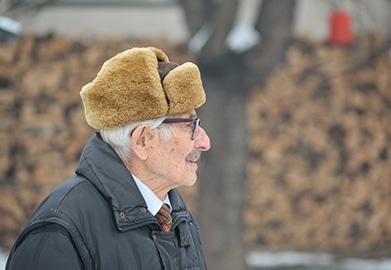How to Care for Your Hearing Aids in Toronto’s Winter


Although the weather in Toronto can get wet and cold, it doesn’t have to stop you from moving around and having fun. However, if you use hearing aids, be extra careful to avoid ruining your hearing products with water and moisture.
Thankfully, protecting your hearing aids from the cold weather isn’t complicated. Read on for tips that will help you keep your hearing aids safe throughout the cold season.
Signs That Your Hearing Aids Got Wet
You may not always see water or moisture on your hearing aids that indicate they got wet. Instead, some telltale signs show that the hearing products contacted moisture.
- You get unclear sounds through the hearing aids
- The hearing aid batteries run out faster than usual
- Distorted sounds from the hearing aids
- White noise in the background
- The devices work intermittently
These signs make hearing difficult and keep you at risk, especially when moving around. However, most of them disappear after the hearing aids dry off. If they persist, you can contact a hearing aid provider for help on how to repair them.
How to Prevent Your Hearing Aids from Getting Wet
Preventing your hearing aids from getting wet is better than dealing with the repercussions of wet hearing aids. Prevent them from getting wet with the following tips:
Keep the Batteries Warm and Dry
Moisture is a primary cause of damaged batteries. It reduces their lifespan and quality. Wet batteries can also damage hearing technology. Therefore, always check the battery compartments and wipe off any moisture. Additionally, keep all extra batteries at room temperature and ensure they are warm and dry.
Dry Your Hearing Aids at Night
Open the battery compartments and wipe out any excess moisture. Leave the battery compartments open to air dry throughout the night. Alternatively, you can use a dehumidifier to dry out the hearing aids after you take them off.
Consult a hearing aid accessory specialist for the best dryer. Avoid using a hair dryer to dry the hearing aids, as they cause more harm than good.
Keep Your Ears and Hearing Aids Warm
Wearing earmuffs or a hat that covers your ears protects your hearing aids from water and snow. Furthermore, keeping warm prevents moisture buildup and condensation in the hearing aids.
5 Dos to Protect Your Hearing Products in Winter
Give Them Time to Air Out
Open your battery compartments and give them time to air out, especially at night. Leave them open overnight for sufficient drying.
Buy a Dehumidifier
Invest in a dehumidifier or a hearing aid dryer to accurately dry all parts. You can also use desiccants to dry out the device.
Use a Clip
A clip fits on your hearing aids to stop them from falling out of your ears. If your hearing aids were to fall into the snow or water, they would be permanently damaged. Therefore, ensure that you use a clip, especially when engaging in vigorous activities.
Have Spare Batteries
Always have enough spare batteries for your hearing aids during the cold season. Batteries will often drain faster when temperatures are lower.
Remove Winter Clothes Carefully
Be careful when removing earmuffs, hats, scarves, and other items to avoid dropping your hearing aids in the snow or water.
5 Don’ts to Protect Your Hearing Products in Winter
Store Your Hearing Products in the Car
The interior of your car can get to extreme temperatures, either too hold or too cold, and these can damage your hearing aids.
Use a Heated Drying System
Always confirm with a hearing aid specialist if you are unsure of the type of dryer you should use. Trying to use a household item, such as a hair dryer, can be harmful to your device.
Forget Your Cleaning Routine
Winter doesn’t mean that your hearing aids don’t need to be cleaned. Be sure that after every cleaning, you give them time to dry thoroughly.
Worry That You Will Damage Your Hearing Aids
Quality hearing aids are made strong enough to withstand extreme temperatures. Therefore, as much as you feel you should be careful, don’t stop yourself from having fun for fear of losing or damaging your hearing aids.
Avoid Contacting Your Hearing Specialist
Don’t try anything you are not sure about without consulting your hearing specialist. They will be able to provide information and advice to keep your hearing aids working their best.
Learn More from Our Hearing Specialists
Cold air and low temperatures should not stop you from enjoying your activities. Instead, focus on avoiding condensation and moisture, and your devices should be fine. In case of any questions or concerns, contact Bravo Hearing Center for professional hearing healthcare.

